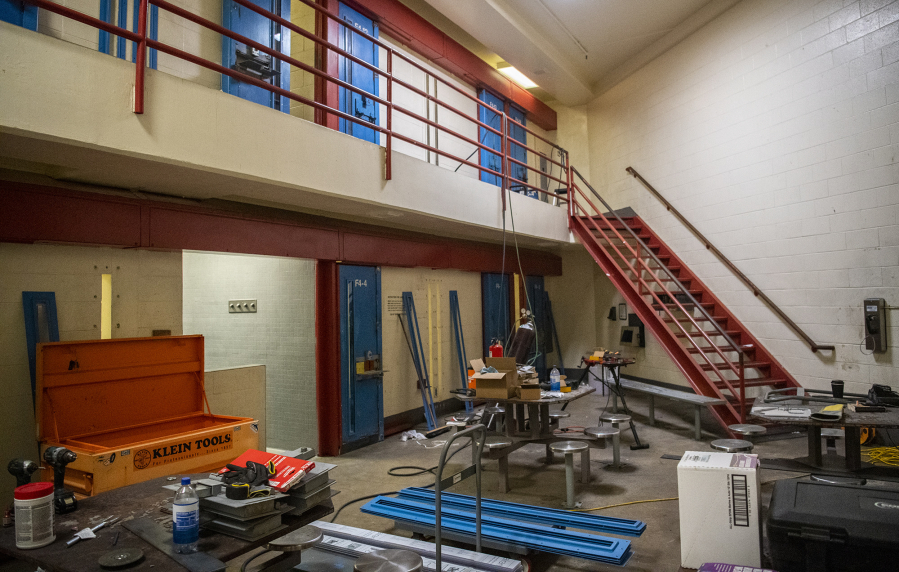Washington would create a new independent agency to set safeguards and conduct inspections of city, county and regional jails, under a proposal a statewide task force is backing.
The agency would develop minimum standards for safety and a gamut of responsibilities such as intake, visitation, discipline, and medical care. It would be able to pursue the closure of facilities where conditions jeopardize the health or safety of workers or incarcerated individuals.
Its oversight powers would not extend to state correctional facilities.
In addition, the agency would have authority to set minimum staffing levels and maximum capacity for each jail. Recommendations the Joint Legislative Task Force on Jail Standards will vote on later this month would guide these thresholds.
The Legislature directed the task force to review the current situation in jails and to make recommendations on restoring a statewide authority to set mandatory minimum jail standards.
“This is a little scary what we’re proposing,” said Lisa Janicki, a Skagit County commissioner and task force member, at the panel’s Wednesday meeting. “But the idea of independent oversight should be an aspirational goal.”
Not every recommendation focused on jail operations. One proposal aims to keep people out of jail by having the Legislature act to limit pretrial detention of those eligible for release who are in jail because they cannot afford bail.
Chanel Rhymes, director of advocacy for the Northwest Community Bail Fund, pushed hard for this provision throughout the process.
The solution to overpopulated and understaffed jails is not locking up people who shouldn’t be locked up, she said.
“It costs a lot to keep people in jail. Most in jail haven’t been convicted. They could be released,” she said Thursday. “The reason they are there is because they don’t have the money.”
New look at an old concern
Setting jail standards is not a new topic in Washington.
In the late 1970s, the Legislature approved a set fashioned by the Washington State Jail Commission.
In 1981, passage of the Corrections Reform Act led to the formation of the Washington Corrections Standards Board, which assumed the functions of the jail commission.
Membership of the board included a county sheriff, state lawmakers, local elected officials, and representatives of the state Department of Corrections and Office of the Attorney General.
In the course of five years, the board held more than two dozen public meetings as it drafted an initial batch of standards. At the time, it had authority to inspect jails – there were 38 then and 50 now – on at least an annual basis and seek to close those with deficiencies.
In 1987, the Legislature voted to eliminate the corrections board despite opposition from the Washington Association of Sheriffs and Police Chiefs, jail administrators, the American Civil Liberties Union, and the Department of Corrections.
Lawmakers passed and then governor Booth Gardner signed a law directing “all units of government that own or operate adult correctional facilities” to develop standards for their jail operations. That same law directed Corrections to adopt standards for the state’s adult correctional facilities.
Two years ago, state lawmakers restarted a conversation by forming the Joint Legislative Task Force on Jail Standards. There are Democratic and Republican lawmakers from the House and Senate, plus 14 others representing local government, law enforcement, jail administration, courts, organizations working with incarcerated persons and a formerly incarcerated individual.
What will make the cut?
The task force spent the past year poring through data, visiting jails and discussing the best approaches to ensure people incarcerated in jail are safe and unharmed while in custody.
Wednesday was the group’s last regular meeting. Members fine-tuned the stickiest proposals. A vote on final recommendations is expected Oct. 18. A report to the Legislature is due Dec. 1
Establishing and adequately funding a new oversight agency is the top idea. This entity would develop mandatory minimum standards within three years. A timeline for compliance would be determined through rule-making.
On-site inspections would be conducted to monitor compliance. Agency officials could ask a Superior Court judge to order a full or partial closure if noncompliance puts the health, safety or security of employees and incarcerated individuals at risk.
Wendy Jones, Whatcom County chief of corrections and a task force member, said in Wednesday’s meeting that the ideas embodied in the recommendations “are essential.”
But she cautioned there could be “a huge amount of pushback” from local elected officials and legislators concerned about the costs of complying.
Beyond setting standards, other recommended tasks for the agency that drew no opposition include:
- Collecting data and producing regular reports on jail conditions and the experience of incarcerated individuals in the jails.
- Providing technical assistance to bring jails into compliance with standards.
- Conducting outreach to people interested in improving jail conditions and operations, and periodically surveying people who are in jail, who have been recently incarcerated and correctional staff.
- Submitting an annual report to the governor and Legislature with recommendations for any needed changes in law.
The group is also on track to support requiring jails provide those in custody with up to 90 minutes of free time each day for telephone or video calls. And it’s looking to provide access to a free and confidential suicide prevention hotline. The suicide rate in Washington jails is one of the highest in the nation, task force members noted.
“It’s a big body of work. I do think jails should be held to a high standard,” said Devon Schrum, executive director of South Correctional Entity, or SCORE, a regional jail in South King County. “We’re all working toward the same goal which is accountability.



